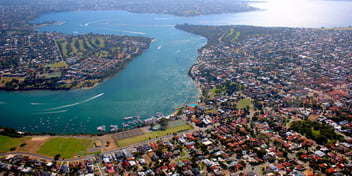Improving water conservation outcomes in the west

As Western Australia continues to adapt to the effects of climate change, including reduced rainfall, Water Corporation is helping communities to reduce water consumption, with the utility’s 25 years experience in water literacy programs bolstering water security in the state.
Working alongside government and the community, Water Corporation has generally had a strong response to its water conservation programs, with the average water use per capita in Perth reduced by 32% over the past two decades.
Water Corporation Demand Delivery Manager Damien Postma said the utility’s approach to water conservation is crucial to ensuring communities’ water use habits are sustainable in the long-term.
“Water Corporation’s water efficiency journey began in the late 1990s and has been a consistent but evolving program, adapting to customer needs and changes in the way we live and behave over the past 25 years,” he said.
“We all have a role to play in securing our water future in response to climate change. Part of our role is to motivate customers to make the necessary changes to their water use to create a sustainable future for WA.”
Postma said a significant cornerstone of supporting and engaging customers was aligning the utility’s water efficiency projects, waterwise programs and marketing under the "Think Climate Change. Be Waterwise" banner.
“Water Corporation has a holistic customer water efficiency program that supports our work to ensure long-term water supply security across Western Australia,” he said.
“We provide many programs, projects and initiatives to support all major customer segments, including metropolitan and regional households, business and industry, councils, developers, office buildings and others.”
Supporting Water Corporation’s overarching climate change communication strategy, water conservation programs are underpinned by three key pillars:
Educate: Increase water literacy to grow awareness of the facts, opportunities and threats posed by climate change.
Demonstrate: Show the benefits and value of saving water to instill a collective understanding of the threats posed by climate change.
Activate: Provide clear, compelling advice and best-practice examples on why and how to change behaviours in adapting to and mitigating the negative impacts of climate change.
“Our water efficiency initiatives align with these categories,” Postma said.
“This is particularly true of the educate and activate pillars which include, for example, initiatives to encourage people to switch off their sprinklers in winter and during rain events.”
Continuing conservation
While Water Corporation has more than two decades’ worth of community water conservation experience, the utility is always looking for new and improved ways of helping its customers reduce the amount of water they use.
This year, as part of the activate program, Water Corporation offered a Spring Sprinkler Service to help optimise home irrigation systems in preparation for summer, Postma said.
“The program was also designed to save water by identifying and fixing leaks, encouraging more uniform watering, and avoiding overwatering sun-stressed lawns,” he said.
“Customers were also offered a rebate on weather-based irrigation controllers, which has helped save water during spring and autumn.”
But Postma said the utility is particularly proud of it’s recently announced, five-year Waterwise Public Housing Project, which is part of the WA Government's Waterwise Perth Action Plan.
“[The project] is the result of an initial pilot to investigate the causes of high water use in public housing. Through the pilot, more than 142 million litres of precious drinking water was saved, and average water consumption fell by 27%,” Postma said.
Under a five-year project expansion, around 10,000 Government-owned properties will be retrofitted with water-efficient fixtures, such as showerheads, toilets and taps.
“In total, the project aims to save 4 billion litres of water and reduce household water bills for public housing tenants by an average $66 to $145 each year before concessions,” Postma said.
“These projects are in addition to our work with high water-use business customers through our Waterwise Business Program. The program requires businesses who use more than 20 million litres of water annually to report on a Water Efficiency Management Plan.
“A data logging program and masterclasses help businesses understand how to use data loggers to identify leaks and unusual water use patterns.”
Measuring success
Given that Water Corporation’s water conservation programs are extensive, Postma said measuring outcomes depends on the targets for each particular goal.
“Each of our programs are designed with targets and water saving goals to suit the context and purpose of the project,” he said.
“Wherever possible these are measured and evaluated using best practice techniques such as those published by the Institute for Sustainable Futures at the University of Technology in Sydney.”
Postma said water conservation goals are always related to water savings but programs have also had positive effects on customers by way of helping to reduce their water bills.
Some of the most significant gains made include 110 billion litres saved since 2007 under the Waterwise Business Program, as well as the participation of 46 councils state-wide in the Waterwise Councils Program.
Furthermore, the Waterwise Towns Program launched in 2013-14 has saved around 1.58 billion litres of water by providing tailored offers and incentives to regional communities.
“Water Corporation operates many schemes across a vast State with a range of communities and climatic conditions, so the programs are designed to the local context,” Postma said.
“Overall, we are trying to assist our customers to meet or exceed their own waterwise aims.”

